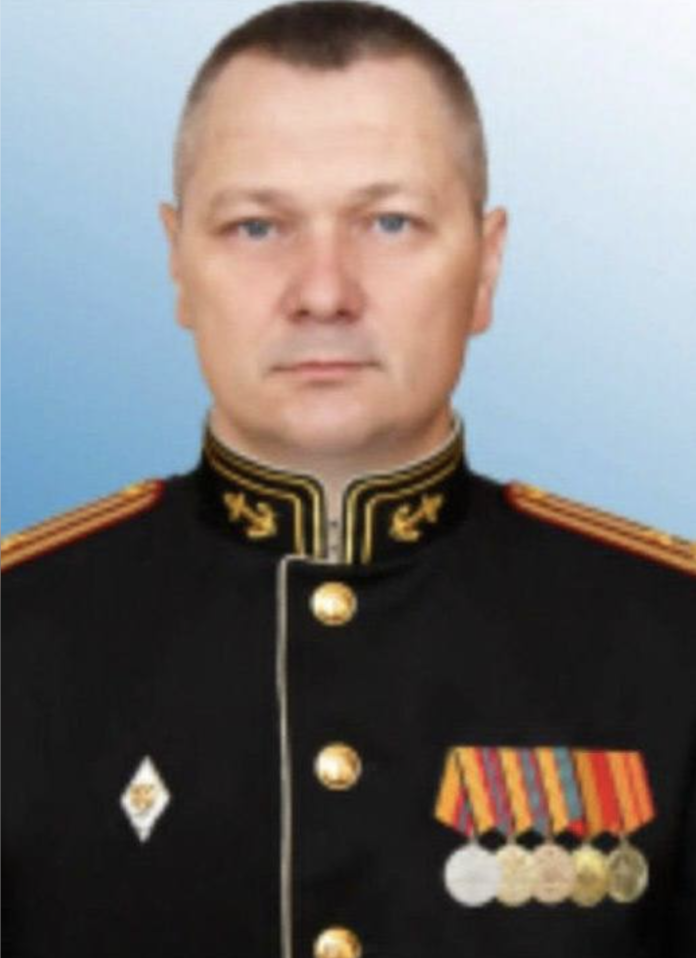A top Russian officer who headed up a prestigious military college and was involved in President Vladimir Putin‘s mobilization campaign for the war in Ukraine was found shot dead in his office, according to multiple Russian media reports.
Where reports differ is whether Vadim Boyko’s death was a suicide or not.
Boyko, the deputy director of the Vladivostok Pacific Naval College, one of only two official military colleges under the Ministry of Defence, was reported to have shot himself by the Far Eastern Vedomosti. The pro-state paper wrote on its Telegram channel that the colonel “came to work and put a bullet in his temple” on Wednesday morning.
Vladimir Oschenko, the editor of a local television station, claimed, too, that Boyko died by suicide.
“When officers begin to shoot themselves, something’s amiss with the country and state service,” Oschenko wrote in a Facebook post, translated by Business Insider.
But reports from independent Russian media outlet Baza and the privately owned online outlet Pravda say Boyko was found with five gunshot wounds in his chest.
Baza, citing unnamed sources, said an on-duty officer heard five shots from the deputy’s office, ran inside, and found the colonel dead. The outlet added that no suicide note was found near the body, though witnesses found five empty bullet cartridges and four Makarov pistols.
Boyko was responsible for working with Russian soldiers who had been conscripted under Putin’s partial mobilization order to send more troops to Ukraine, Baza reported. He’s the latest prominent Russian figure to die under mysterious circumstances since Russia invaded Ukraine.
Recently, the former head of a Russian aviation research university, Anatoly Gerashchenko, died on the institute’s grounds after reportedly falling down numerous flights of stairs in late September. The Moscow Aviation Institute, where Gerashchenko was serving as an adviser at the time, said the death was accidental.
Trending Now
Oakville high school at centre of teacher attire controversy receives bomb threat
Xi wasn’t criticizing Trudeau during G20 confrontation, China says
A few days later, a gunman shot a Russian enlistment officer at a recruitment centre in Siberia days after Putin’s mobilization plan went into effect, which called up hundreds of thousands of civilians to fight in the Ukraine war. Discontent over the measure sparked anti-conscription protests across the country.
A gruesome video of the shooting taken from within the recruitment office shows a man walking up to another man and shooting him once at point-blank range, sending people scattering from the building. The injured officer was identified as Alexander Vladimirovich Eliseev by local governor Igor Kobzev.
At least 10 other high-profile Russians have died this year:
Vladimir Nikolayevich Sungorkin, the editor-in-chief of major state newspaper Komsomolskaya Pravda, died “suddenly” after appearing to suffocate, according to the paper he used to helm. An initial medical examination found that Sungorkin may have suffered a stroke. The Kremlin called his passing “a great loss to Russian journalism.”Ivan Pechorin, an energy executive, died after falling overboard from a speed-boat and his body was later found after washing up on the coast of Russky Island in the Sea of Japan.Ravil Maganov, chairman of the board of Russia’s largest private oil company, Lukoil, died after falling out of the sixth-storey window of a hospital. Lukoil was one of a few Russian companies to call for an end to Russia’s invasion of Ukraine.Alexander Subbotin, a former top manager for Lukoil, was found dead in the basement of a shaman’s house after allegedly receiving a hangover treatment involving toad venom.Sergey Protosenya, a former executive at Novatek, the largest independent natural gas producer in Russia, was found hanged outside a Spanish villa along with the bodies of his wife and 18-year-old daughter. The deaths appeared to be a murder-suicide.Vladislav Avayev, former vice-president of Gazprombank, Russia’s third-largest bank, was found dead in his Moscow apartment along with the bodies of his wife and 13-year-old daughter. The deaths also appeared to be a murder-suicide. Avayev and his family were found one day before Protosenya and his family died.Vasily Melnikov, owner of Medstom, a company that imports medical equipment into Russia, and his family were all found dead in their luxury apartment in Nizhny Novgorod. Melnikov, his wife, and their 10-year-old and four-year-old sons had been stabbed to death and the murder weapons were found at the crime scene. Investigators again concluded that the deaths were a result of a murder-suicide.Mikhail Watford, a Ukrainian-born oligarch who made his millions as an oil and gas tycoon, was found hanged in the garage of his home in Surrey, U.K. Watford’s wife and children, who were home at the time, were not harmed. Watford changed his last name from Tolstosheya after moving to the U.K. in the early 2000s.Alexander Tyulyakov, deputy general director of the treasury department for Gazprom, the largest publicly listed natural gas company in the world, was found hanged in the garage of his cottage. A note was found with his body leading investigators to conclude that Tyulyakov died by suicide.Leonid Shulman, a top executive at Gazprom, was found dead in the bathroom of his cottage next to an apparent suicide note in the same neighbourhood where Tyulyakov would die a month later.
2:16
NATO, Poland say missile strike wasn’t deliberate Russian attack
© 2022 Global News, a division of Corus Entertainment Inc.



